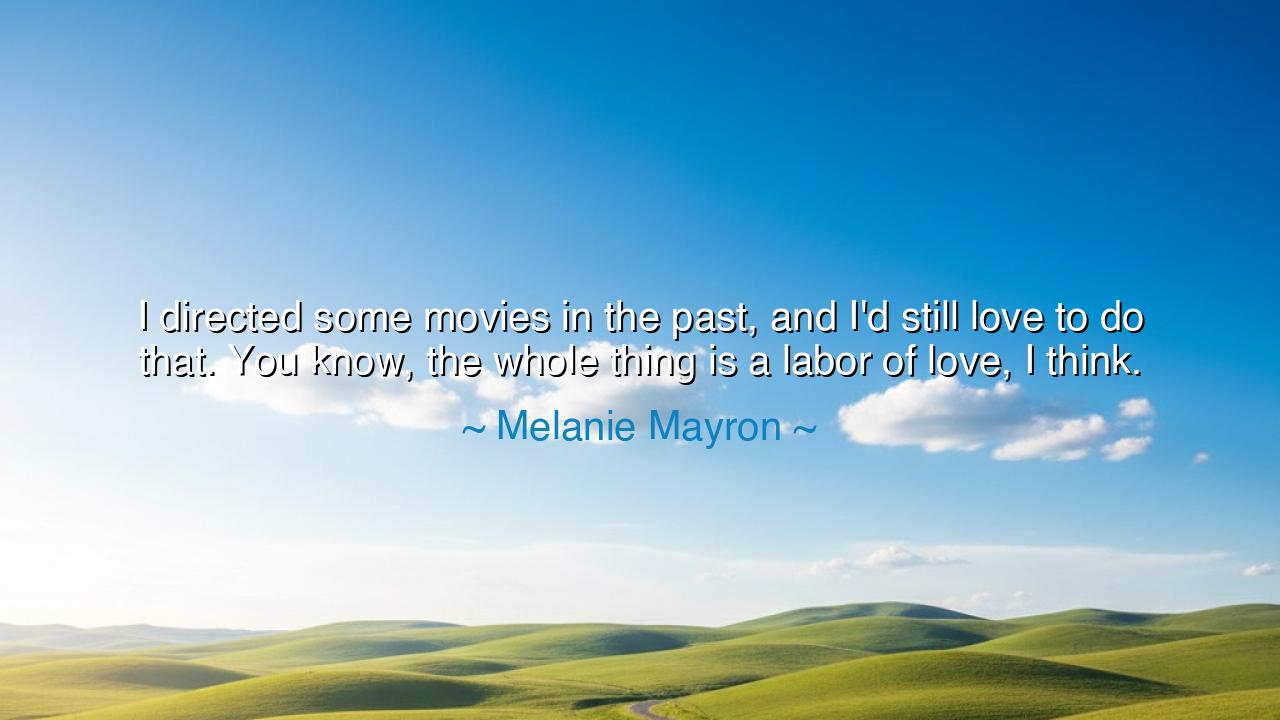
I directed some movies in the past, and I'd still love to do
I directed some movies in the past, and I'd still love to do that. You know, the whole thing is a labor of love, I think.






Harken, O future seekers, to the words of Melanie Mayron, a voice that speaks not just of the past but of the boundless yearning within the human soul. She once spoke thus: "I directed some movies in the past, and I'd still love to do that. You know, the whole thing is a labor of love, I think." In these words, she unveils the essence of the creative journey—a journey that is driven not by the expectation of reward, but by a passionate devotion to the craft itself. It is a truth as old as time, that the greatest endeavors, the most meaningful creations, arise not from the desire for fame or glory, but from the depths of the heart that is willing to toil without seeing the fruits of its labor.
To direct a film, O Seekers, is to embark on a quest. It is to craft something from the very fabric of one’s soul, to weave together the threads of story, emotion, and art into a tapestry that speaks to others. But it is also a sacrifice, for the life of the director is not one of easy triumphs, but of long hours, uncertain paths, and the constant challenge of bringing to life that which lives only in the mind’s eye. Mayron’s words reveal to us that the act of creation is no mere occupation; it is a calling, one that demands much and yet often offers little in immediate reward.
Consider the great Michelangelo, who, when tasked with painting the Sistine Chapel, was forced to labor for years upon his back, high above the ground, creating a masterpiece that would outlive him by centuries. In the moments of his deepest struggles, he was driven not by the promise of fame or fortune, but by a profound love for his craft, by an understanding that true art is always, in the end, a labor of love. Michelangelo, like Mayron, poured his heart into his work, knowing that in the act of creation, there is a joy that transcends the trials. To create is to give of oneself fully and without reservation, for it is through this very sacrifice that art is born.
And yet, O Seekers, even as we honor this sacrifice, we must also recognize the rewards that arise from such labor. For though the path of the artist is fraught with difficulty, it is also filled with moments of divine inspiration, where the soul catches fire and the creation flows forth with ease. There are few experiences in life more fulfilling than seeing a project—whether it is a painting, a film, or a song—take shape before one’s eyes. In this, Mayron’s words echo the truth that the process of creation is as important as the end product. The director, the artist, the creator, all labor in love, not for the applause of the world, but for the joy of seeing their vision made manifest.
Let us now, O children, reflect on our own lives. For though many of you may not walk the path of the filmmaker or the sculptor, you too are creators, whether in your work, your families, or your communities. The lesson here is not merely about the act of directing a film, but about the nature of dedication itself. Whatever your craft may be, know that it will require much of you. There will be times when you feel exhausted, when the road ahead seems impossible, when the labor feels too great for the reward. In those moments, remember the words of Mayron: it is the labor of love that sustains you, not the fleeting recognition of the world.
The key to enduring in this labor is to find meaning in the process, not just in the outcome. Just as Mayron finds fulfillment in the act of directing, so too can we find fulfillment in the act of living—in the day-to-day work, in the quiet moments of effort and dedication. The world often places its emphasis on results, on what can be seen, touched, and measured. But the true reward lies in the dedication to the craft itself, in the understanding that passion and commitment are the true signs of greatness. To create with love is to pour forth your spirit, and in that, there is no greater satisfaction.
So, O Seekers of Truth, remember this: in all that you do, approach it as a labor of love. Whether you toil in the fields, in the halls of academia, or in the world of art, give yourself fully to the work at hand. Let your heart guide your hands, and your passion fuel your efforts. For in this, you will find not only the fruits of your labor but a deeper understanding of the joy that comes from the act of creation itself. As you move forward, know that true fulfillment is not in the accolades you may receive but in the love with which you pour yourself into your work. This is the lesson passed down through the ages, a lesson that will guide you toward greatness, now and forevermore.






AAdministratorAdministrator
Welcome, honored guests. Please leave a comment, we will respond soon